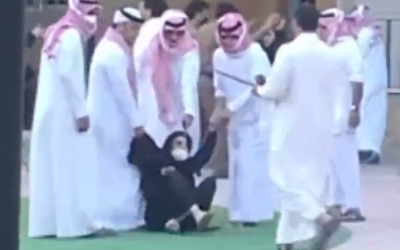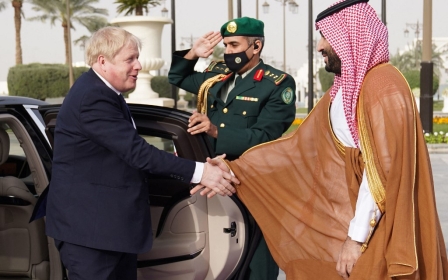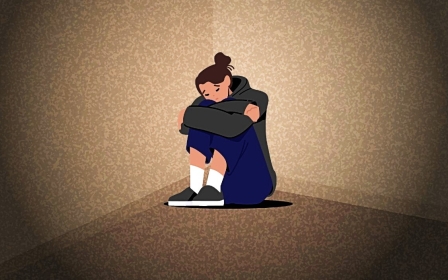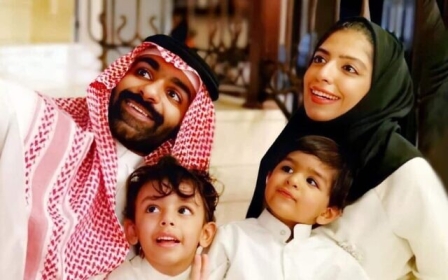UK fund to Saudi Arabia drops women's rights from description
Women's rights were removed from a description of what a UK government fund supports in Saudi Arabia, a week after the kingdom sentenced a Leeds University PhD candidate and mother to 34 years in prison over her tweets.
Campaigners said the lack of clarity over what the Gulf Strategy Fund (GSF) does support in Saudi Arabia, at a time when the human rights situation there is deteriorating, raises questions about whether the UK is bolstering institutions that carry out abuses.
The GSF, which has so far given £70m ($80m) to six Gulf states, has been criticised by MPs and rights groups for leaving the public largely in the dark about how it is run and taxpayer money is spent.
The government first published a brief summary of what the GSF supports last year after MPs held a 90-minute debate demanding answers about the fund in October 2020.
In the summary published in June 2021, it says the GSF "bolsters the strategic partnership and delivers mutual prosperity and security by supporting Saudi Arabia's Vision 2030 reforms across priority sectors in line with UK values, including women's rights".
New MEE newsletter: Jerusalem Dispatch
Sign up to get the latest insights and analysis on Israel-Palestine, alongside Turkey Unpacked and other MEE newsletters
But in the Saudi Arabia section of a new summary published on 26 August, a week after Salma al-Shehab's 34-year sentence over her social media activism made headlines, women's rights are no longer referenced at all.
Days later, it emerged that a second Saudi Arabian woman, Nourah bint Saeed al-Qahtani, was given a 45-year sentence also over her tweets.
Middle East Eye asked the Foreign Commonwealth and Development Office (FCDO), which oversees the fund, why women's rights had not been listed this year.
An FCDO spokesperson said: "The Gulf Strategy Fund supports work in the region in a number of important areas, including human rights, cyber, and science and innovation.
"The UK continues to work with international partners to increase female participation in the labour market and society in Saudi Arabia."
MEE understands that the GSF has previously funded an International Women's Day campaign that provided Saudi Arabian female artists with a platform to exhibit their work across the kingdom.
Participants in the exhibit received bespoke training to develop their communication and leadership skills to support their career development.
However, it is not clear which Saudi institutions the fund has supported or how much has been allocated to each of them. An FOI request filed by the UK-based Bahrain Institute for Rights and Democracy revealed last month that UK government funding to the kingdom through GSF doubled to £1.8m ($2m) in 2021-2022.
'Extremely concerning'
Without clarity over exactly what is funded, rights groups said they fear the UK is supporting repressive bodies.
Lina al-Hathloul, head of monitoring and communications for the human rights group Alqst, said the newly published summary "still doesn't provide clear and transparent answers" and questioned how the GSF is supporting human rights in Saudi Arabia.
"If GSF funding still includes support to government institutions in Saudi Arabia, the UK could be complicit in bodies carrying out or whitewashing human rights abuses," she said.
"This includes the Human Rights Commission that denied the torture of Saudi women's rights activists despite having visited them and seeing the signs of torture firsthand on the activists' bodies."
Dana Ahmed, Middle East and Gulf researcher at Amnesty International, called the fund "extremely concerning".
"Saudi Arabia's dire human rights record of silencing dissenting voices, executing individuals, including juveniles and minorities after grossly unfair trials, and ruthlessly crushing the basic rights of citizens and residents needs to be thoroughly addressed," she said.
"The UK government must ensure complete transparency of these funds and how it is supporting human rights. Otherwise, the UK is essentially supporting the continued repression of people in the kingdom."
Middle East Eye delivers independent and unrivalled coverage and analysis of the Middle East, North Africa and beyond. To learn more about republishing this content and the associated fees, please fill out this form. More about MEE can be found here.





